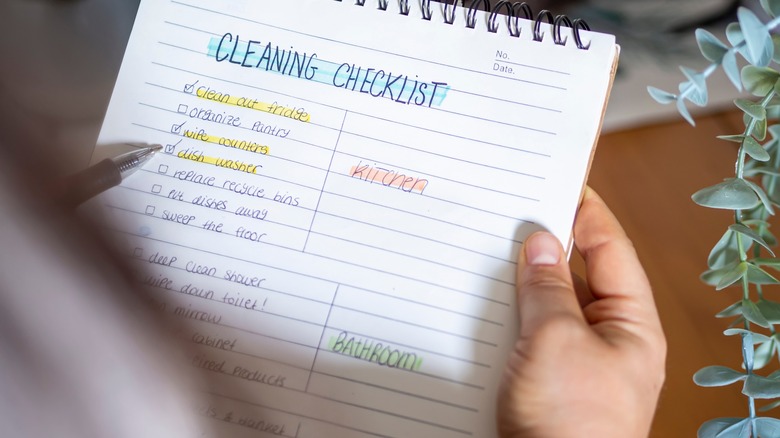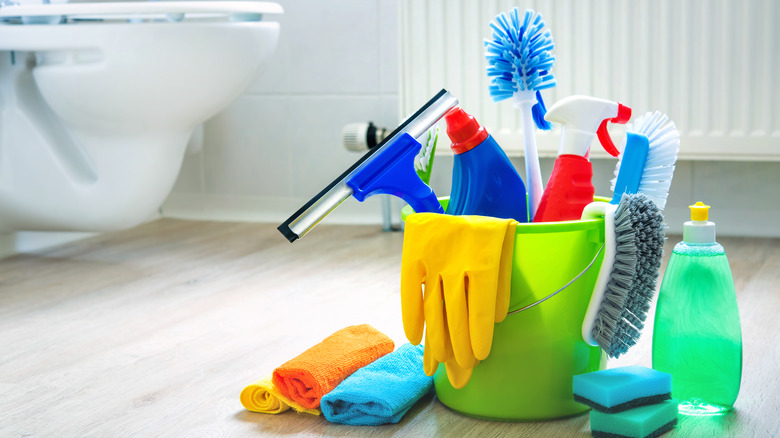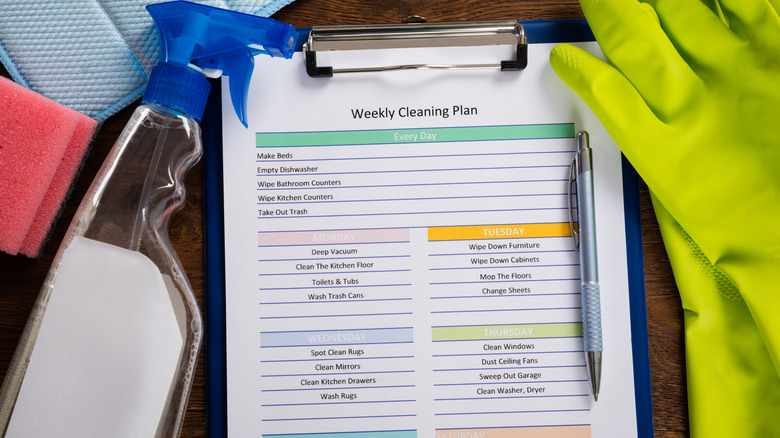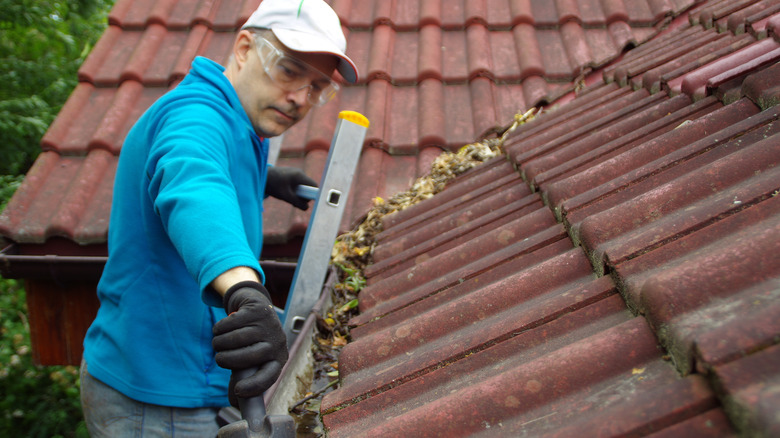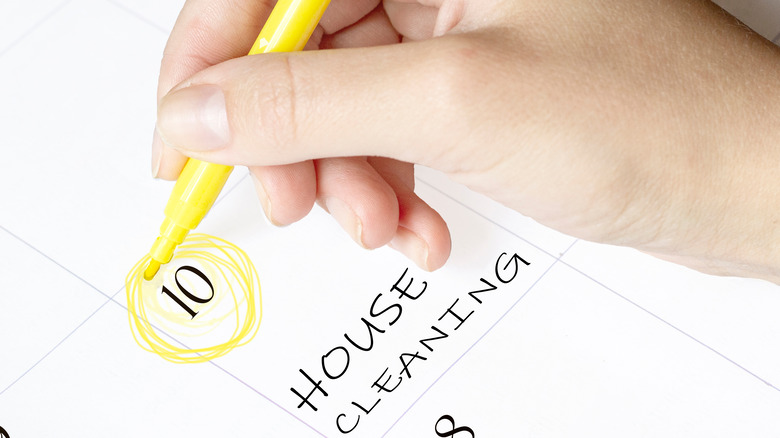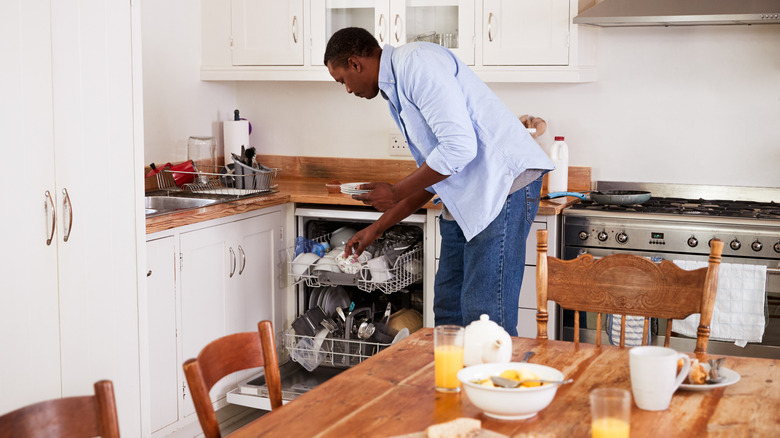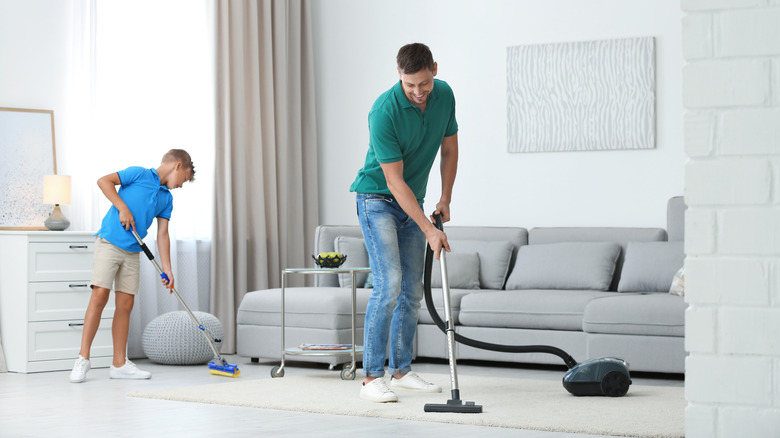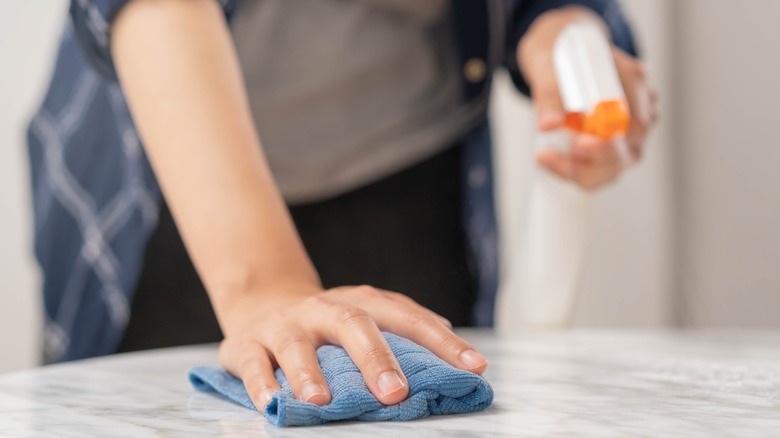How To Create An Effective Cleaning Schedule
Ask someone to name a chore they do not like, and chances are cleaning is one of them. This response makes sense because cleaning can be a tedious task. You work hard to make your home look spotless, and in a day it feels like everything you did was for naught. But cleaning is a chore that can't be overlooked for too long despite your best efforts. Thankfully, there are ways you can streamline the system so it doesn't always feel like you're cleaning or thinking about it.
One such way is to create a cleaning schedule. You might run at the idea of a schedule, but if you keep it simple, it'll make cleaning more effective and manageable. Any home project can be broken up into sizeable chunks that are easy to do and simple to schedule. And the first step to tackling any large project, including cleaning, is to make a plan. This is the method that Set Things Straight uses, and it always begins with preparation, followed by scheduling a time to execute it and a little extra padding for setbacks.
Keep a running list of tasks
Every home is different, and that means so will every cleaning schedule. Some have more rooms than others, and not all will need to have certain areas cleaned as often. That's why one of the first things you should do when planning your personal cleaning schedule is to create a running list of tasks. While you can sit down and brainstorm what you want to do, the best method is to walk through your house inside and outside and take notes.
According to Lock and Key Home Organization, prep work is just as important as the actual cleaning itself. And when you walk through your home, you're going to note things you otherwise wouldn't if you just sat down and created a list. For example, when you stand in your kitchen, ask yourself what you want to focus on when cleaning there. And don't write down only surface things — also think about deep cleaning tasks. These are things you won't do every week or month but should be noted as you'll divide these tasks into the next few steps.
Start a supply list
One of the most important steps in creating a cleaning schedule is figuring out your supply list. As we mentioned before, all homes are different and will need different supplies. You might also be more attentive to the ingredients and prefer more sustainable products. Again, take the time to write down a list of supplies you know you'll need. Does anything need to be replaced? Has your mop and broom seen better days? How is your stash of cleaning rags?
There are a ton of cleaning products available on the market today. But if you need a basic idea of where to start, Imagine It Done offers some great options. You'll want to focus on finding a multi-purpose cleaner and microfiber rags. Don't ignore the amazing power of baking soda and white vinegar — you can make some impressive DIY products using those two ingredients alone. And for more sustainable products you can check out Blueland, Grove Collaborative, and Earth Hero. The thing you want to focus on most is getting supplies you know you will actually use. Cleaning will be a breeze when you gather the right supplies since you know you have everything you need.
Separate tasks into weekly and monthly lists
Now that you have your running list of tasks and supply list, the next step in creating an effective cleaning schedule is to divide and conquer. This is as simple as separating all your functions into weekly and monthly lists. You do this to avoid overwhelm and set routines that will become easier to follow and stick with. For example, it may not be necessary to deep clean your tub every week, but it might serve you best to do it monthly. Note the areas that get dirty the fastest. Those should go on your weekly list. The areas that take longer can be saved for your monthly routine.
One way to ensure you're creating weekly and monthly lists that work is to go over everything with your family. If you ever had difficulty getting the entire household involved in cleaning, this new schedule will change that. As The Everygirl states, chores are one of the leading causes of arguments among partners and family members. But if you work with them to create simplified weekly and monthly cleaning lists, everyone will be more inclined to work together. Get their opinion because they may notice something that you don't. Or they may be willing to take the reins on something.
Break tasks down into seasons
If you're separating tasks correctly, you may find that you have a few things left after dividing them into weekly and monthly schedules. That's fine because those tasks end up being the ones that don't require constant attention. This is where a quarterly or seasonal cleaning schedule comes into play. You're bound to have things that only need a deep clean every three to four months. Think of spring cleaning as an example. You might do certain things during that time of year, but you should create a cleaning list for every season.
According to Hilary Bernstein, a seasonal cleaning routine is perfect for implementing, especially around the holidays. She does a deep clean right before Thanksgiving and Christmas. Another time she cleans is at the end of August, before the school season starts. Finally, she tidies up in January after the hustle of the holidays and in April for regular spring cleaning. The tasks you do during this time could be larger tasks like cleaning your gutters, storing outside furniture, or power washing your home. How you split your seasonal cleaning schedule will vary depending on where you live and what remains on your running list of tasks.
Schedule time on your calendar
By now, you should have a few cleaning routines. You've done the prep work of figuring out when you want to clean, but now what? It's time to schedule it on your calendar. This is by far one of the hardest things to plan for because you don't always know what's going to happen a month from now or in three months. That's why the best option is to pick a tentative time and do your best to stick with it when it comes around. Consistency is key when it comes to solidifying a cleaning schedule. While you may have to reschedule cleaning every now and then, you'll be more inclined to stick with the schedule if you get it done on the day or days you originally planned for.
The New York Times reports that working smarter, not harder, is your way to go. Meaning you want to clean on days you know you have time or can at least get a head start on. Don't begin cleaning a room, ignore it for two weeks, and finish it then. Your goal is to try and get all the tasks on the list you're working from completed in one to three days. That's why planning the list with your family will be helpful because you can divide the tasks and get everything done in a timely manner. But if you live alone and are responsible for cleaning everything, it's important to schedule cleaning more often.
Prioritize the most important tasks
If you're super strapped for time due to other commitments, one way to ensure you're getting something done is to prioritize the most important tasks on your list. For example, if you're working on your weekly cleaning list but can't get everything done in the allotted timeframe, look over the list, look at the areas and clean the ones that desperately need it. This will happen more often than not, so you must learn what should be prioritized and what can wait another week or month. The nice thing about this is that it's easy to spot when something really needs to be cleaned. That's what you focus on.
But if you need more help prioritizing cleaning tasks, One Good Thing has you covered. A few cleaning duties it says you should never skip if you're in a rush include wiping down countertops, doing the dishes, and vacuuming. The few you're free to skip, for now, include dusting, mopping, and laundry (unless you have no clothes to wear.) The more you practice prioritizing, the easier it'll be to determine which tasks can be skipped for another week and which can't. What matters is that you get through the entire list at one point, so you don't fall too far behind.
Laminate and delegate
If your goal is to get the entire family involved in cleaning, you need to laminate and delegate. This is done by setting the cleaning schedule somewhere everyone will see, like a family command center (if you have one) or on the refrigerator. If you laminate it, you'll be able to use dry-erase markers on the page without needing to print out a new copy every time. You can also break the task list up by person and create a spreadsheet rather than a running list of tasks. But when working on getting kids, especially teens, involved in household chores, Imagine It Done recommends starting early.
The earlier you teach your kids to help around the house, the more it'll become a habit for them. However, if you haven't started early, don't worry. Another suggestion it recommends is assigning chores appropriately. This essentially means you assign tasks to someone whose capable of handling it. Don't give dishes to your toddler who can barely reach the sink. Instead, have them pick up toys from the floor. What matters most is making it clear where the schedule is and when you expect things to be done. Adding a little reward system for a job well done doesn't hurt either.
Do simple daily tasks
To really stay on top of cleaning, you can also create a short list of daily tasks that take little time to do. You might be groaning at the idea of another list, but simple daily chores are things you can easily implement into your everyday routine. Once they become an integral part of your lifestyle, it won't feel like you're taking time away from social media or binge-watching. According to The New York Times, keeping surfaces clean and straightening things are two easy-to-add cleaning tasks you should do daily.
Other simple tasks may include wiping down kitchen counters, dusting the television stand or coffee table, and tidying up before heading to bed. It's also a good idea to add daily dishwashing to your routine. This is as simple as making sure the sink is empty every night. Whether that means filling the dishwasher or giving the dishes a quick clean, an empty sink is a wonderful thing to wake up to each morning. So when coming up with your daily task list, keep it short. It should have no more than five tasks, and delegate them if necessary.
Create a cleaning playlist
We mentioned before that cleaning is one of the least exciting chores. But there is a way you can make it more fun, and creating a dedicated cleaning playlist is at the top. Music generally pumps people up, and what better chore to add it to than cleaning? For starters, you're moving your body, so music is a great thing to add. However, it is possible to choose the wrong songs for your playlist. You want music that will give you energy, not slow you down.
The Maids agree and note that music has the power to reduce fatigue, increase stimulation, and improve motor coordination. And since cleaning involves all of that, it's a perfect match. But the question remains: When should you create your cleaning playlist? Definitely not right before you begin cleaning. That's a one-way ticket to procrastination. Create your playlist during your main prep work. Start creating your playlist as you begin writing your list of tasks and dividing them. This way, you have everything ready to go, and when it's time to clean, all you have left to do is press play.
Do a nightly tidy-up
We touched briefly on this when we talked about simple daily tasks, but it's important to dive deeper into this topic. One of the best ways to stay on top of cleaning, and clutter, is to implement a nightly tidy-up routine. This is nothing more than you walking through the house and putting things away where they belong, making sure surfaces are clear, and finishing tasks you had to put off earlier. This effective routine should take no more than 10 minutes and, according to Budgeting for Bliss, will give you stress-free mornings.
How so? Because when you complete this short list of tasks, you will wake up knowing they're done. You won't walk into the kitchen to a sink full of dishes. You won't have a pile of unopened mail sitting on the spot where you have breakfast. You're essentially completing a short list of daily tasks that will make your mornings more streamlined. Give everyone in your home one to two nightly jobs and watch how quickly it becomes a habit. Because when you start waking up knowing you don't have any cleaning to do, you're going to feel more at ease.
Update schedules when necessary
You've done all the prep work, you're confident with your lists, and everyone is on board with what they need to do daily, weekly, or monthly. But it's important to note that effective cleaning schedules can change. That's why you should at least twice a year go over your task list and ensure it all makes sense. When you run through the list, ask yourself if certain tasks work where they are. Can anything be moved from monthly to seasonal? Is there something on the weekly list you should do daily instead? Housewife How-Tos notes that cleaning becomes easier the more you do it, and sticking to a routine helps in that case.
But every now and then, the schedule you created will stop working with your current lifestyle, and that's when it's time to update it. Re-evaluating your cleaning schedule can happen for several reasons. Perhaps you moved, and your new home is smaller. Or maybe you got a new job and your hours have changed, which means the daily tasks need to be done at another time. Whatever the reason, don't be afraid to update your cleaning schedule when necessary. The minute it stops working is the time you should sit down and do another walk-through. The best part is the more accustomed you become to cleaning, the easier it'll be to update your schedule and implement new routines.
Give yourself a break
Remember how we said cleaning is often people's least favorite chore? Well, it's good to know that even with a cleaning schedule and a strict routine, you're going to miss cleaning days. Things are going to happen that throw your entire plan out of balance, and you'll need to set aside certain things until order is restored. That means not beating yourself up when you cannot stick with your schedule. Yes, you worked hard to create and stick with it, but life will still get in the way. The best thing you can do is embrace it.
Clean My Space is well aware of how much people despise cleaning. And while one has to believe in the power of a good cleaning schedule, people also have to be realistic. Cleaning already gives people high levels of stress and anxiety. Don't add more by giving yourself the third degree because you skipped a monthly cleaning. There will come a day when you can reschedule things. What matters is that you accept when things don't go according to plan, and rather than thinking you need to start all over again, simply pick up where you left off. You will get your home clean again. Your schedule will be waiting until you return.
